This post was written May 13, 2015, but is every bit as relevant today. :-)
Yesterday, the Colorado Rockies lost their eleventh game in a row and are cemented in last place.
It’s May. We’ve got 130 games to go.
Last spring, I was stunned when Vegas oddsmakers listed the 2014 Rockies’ over/under (for total number of wins) as 76 games. 76 games! What a joke, thought I. They will easily win 76 games; they have the best offensive lineup in baseball, with promising young pitchers and a solid bullpen. I predicted their win total to be about 88 games and felt they had a good chance of making the Wild Card. I have never bet on a sporting event (except for the NCAA basketball pool, which hardly seems to count), but here was my chance. If I put a thousand dollars down on the Colorado Rockies winning over 76 games, I would win $1900.
I never placed the bet.
Total wins for the Colorado Rockies, 2014: 66.
This year’s over-under was 71 ½ games. And again, I had the same thought: What? They’re absolutely going to win 72 games. Those people in Vegas clearly don’t know what they’re doing.
Which brings us to today’s topic: How my sports fanaticism turns me into an idiotic optimist.
What I tell my friends: “Yeah, they’re going to suck again. Too bad the owners are so cheap they didn’t get us an ace.”
What I secretly think: We are going to win it all. This city is going to go nuts.
What I tell my friends: “We’ve got the number 5 starter for the Phillies last year as our Opening Day pitcher!? The season is already doomed.”
What I secretly think: Kendrick’s going to flourish. Gray and Butler are going to compete for Rookie of the Year. De La Rosa’s going to win the Cy Young. That Matzek kid looks good. Ottavino is freakin’ unhittable.
Whence this lunacy?
Here’s how it works: We have four position players (Tulowitski, Gonzalez, Arenado, and Morneau) I would take over almost anyone else at those positions. We have great late-inning relievers. So our starting pitching just needs to be competent. If everyone stays healthy, we have a shot at the playoffs.
You may say, Uh, except for one thing, Dave: that’s never happened. No team has ever won with mediocre starting pitching. To which I would respond, “How wrong you are, my friend.”
It’s the Curse of 2007.
In 2007, the Rockies finished the season winning fourteen of their last fifteen games, won a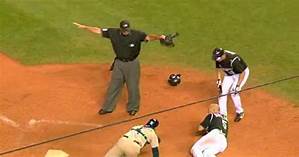 thrilling fourteen-inning play-in game against San Diego (I recently watched a video of the winning run: Matt Holliday still hasn’t touched home plate, and the catcher still hasn’t tagged him), and then swept the Phillies and Diamondbacks to make the World Series—in other words, they won 20 of their last 21 games. They then had to endure a ridiculous eight-day delay (the longest wait in baseball history) before the World Series began, during which it snowed in Denver, they were unable to practice, and they completely cooled off. By the time the players got their swings back, the Red Sox had blown them out in what must be considered the Most Boring Series Ever—except for all those long-suffering Sox fans, of course.
thrilling fourteen-inning play-in game against San Diego (I recently watched a video of the winning run: Matt Holliday still hasn’t touched home plate, and the catcher still hasn’t tagged him), and then swept the Phillies and Diamondbacks to make the World Series—in other words, they won 20 of their last 21 games. They then had to endure a ridiculous eight-day delay (the longest wait in baseball history) before the World Series began, during which it snowed in Denver, they were unable to practice, and they completely cooled off. By the time the players got their swings back, the Red Sox had blown them out in what must be considered the Most Boring Series Ever—except for all those long-suffering Sox fans, of course.
A thrilling season, in other words, but for the WS loss. So why, you ask, was that a curse?
Because miracles don’t happen twice.
Because 2007 has imbedded itself in the minds of Rockies’ management. They learned a terrible lesson: that they can actually win with homegrown talent, great hitting, and mediocre pitching.
They have since followed that formula every year since, with the same results. Right now they’re 11-19 and solidly in last place—in what has become a very strong division. And they don’t have an ace.
In other words, we’re screwed again–and at a time when this sports-crazed town desperately needs the Rockies to be competitive. The Broncos blew it again, the Nuggets have been awful, the Avs are mediocre. We turn to the Rockies for salvation. We need them to be good this year. And yet they are already not.
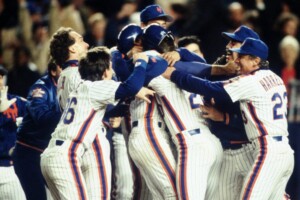 I grew up as a Mets fan, so (except for that brief and magical interlude in 1986) I have spent most of my life ardently devoted to losers. I’m beginning to think that I’m a fan of these teams BECAUSE they lose. In other words, there must be something about me that wants and needs to cling to hope when there is none.
I grew up as a Mets fan, so (except for that brief and magical interlude in 1986) I have spent most of my life ardently devoted to losers. I’m beginning to think that I’m a fan of these teams BECAUSE they lose. In other words, there must be something about me that wants and needs to cling to hope when there is none.
Believe me, I’m laughing at myself. What is wrong with me? But really, the Rockies would have been so good last year were it not for all their injuries! I mean, whoever heard of five players breaking their hands, and every starting pitcher on the Disabled List? What rotten luck!
I’m so pathetic.
But still: the Rockies really have had rotten luck. It’s as if they used it all up in 2007. And for a team to succeed, it has to have talent, yes, but also extraordinary luck: it must somehow keep everyone healthy, and it has to have timely hitting that means they win more one-run games than they lose—and often that’s just a matter of a line drive hit slightly to the left of the center fielder instead of right at him, or a hard ground ball going through the hole instead of within range of the second baseman, or a looping hit down the line that kicks up chalk instead of landing just foul. It also means the 3-2 slider nipping the corner, the right fielder not slightly misjudging that gapper in the ninth . . .
In other words, the cliché is true: baseball is a game of inches.
Actually, all sports are games of inches.
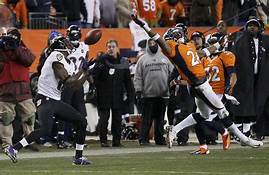 Think about it: If Rahim Moore had properly defended Joe Flacco’s pass at the end of the 2013 Ravens-Broncos playoff game, the Broncos would probably have gone on to win the Super Bowl and nobody would be talking about Peyton Manning’s inability to win the big one. If Chris Wondolowski would have kicked the ball a little more gently at the end of the U.S.-Belgium game, the U.S. may have advanced to the World Cup quarterfinals.
Think about it: If Rahim Moore had properly defended Joe Flacco’s pass at the end of the 2013 Ravens-Broncos playoff game, the Broncos would probably have gone on to win the Super Bowl and nobody would be talking about Peyton Manning’s inability to win the big one. If Chris Wondolowski would have kicked the ball a little more gently at the end of the U.S.-Belgium game, the U.S. may have advanced to the World Cup quarterfinals. If Tony Parker had slapped the ball out of Ray Allen’s hand before Allen made his game-tying three-pointer at the end of Game 6 in the 2013 NBA finals (watch the replay—Parker’s hand is an inch away, and I still have no idea why he didn’t try to slap it away before Allen rises up to shoot it) we’d be talking about a Spurs dynasty and NBA teams would be focused on building great teams, not luring superstars. If Russell Wilson had thrown the ball slightly to his receiver’s left (or Macolm Butler had hesitated a millisecond before dashing toward the ball), there would have been no interception, we’d be talking about a potential Seahawks dynasty, and the national conversation about the Great Tom Brady would be about how many Super Bowls he’s lost rather than how many he’s won.
If Tony Parker had slapped the ball out of Ray Allen’s hand before Allen made his game-tying three-pointer at the end of Game 6 in the 2013 NBA finals (watch the replay—Parker’s hand is an inch away, and I still have no idea why he didn’t try to slap it away before Allen rises up to shoot it) we’d be talking about a Spurs dynasty and NBA teams would be focused on building great teams, not luring superstars. If Russell Wilson had thrown the ball slightly to his receiver’s left (or Macolm Butler had hesitated a millisecond before dashing toward the ball), there would have been no interception, we’d be talking about a potential Seahawks dynasty, and the national conversation about the Great Tom Brady would be about how many Super Bowls he’s lost rather than how many he’s won.
So why bother? I mean, if so many key incidents in sports are ruled by chance, and 99% of the time one’s devotion to a sports team results in heartbreaking frustration, then why bother?
This is the unspoken question my wife asks when my mood turns sour after another Rockies loss. What on earth is the big deal? It’s so beyond her (or any intelligent person’s) understanding that she typically doesn’t believe me; something else besides a stupid baseball game must be the cause of my foul mood. Was it something she did? Something work-related? “No,” I said to her yesterday, “really, it’s because the Rockies lost again, and they could have won, if only . . .”
I didn’t bother trying to explain the many reasons why the Rockies lost: the manager bringing in the righthander when the lefty was pitching great; the baserunning mistake that would have provided the tying run, the rightfielder overthrowing the cut-off man, which allowed the runner behind the play to advance and later score on the infield hit. Instead, I apologized. “I’m afraid this is who you’re married to,” I said. “A guy whose mood can completely change based on the outcome of a sporting event.”
If you’re a sports fan, and you’re reading this, you’re nodding your head. But here’s the question: Why? Why do otherwise somewhat-intelligent people completely fall in love with a group of athletes chasing a ball around in a completely meaningless enterprise? Or to paraphrase Jerry Seinfeld, since we remain loyal to a team even after they trade away our favorite players, why are we so devoted to the color of a uniform? How is it that we’ve become fans of laundry?
It must be that it satisfies, or feeds, some elemental need in us to perpetually hope for something. Because for the majority of fans (Cubs Nation, take note), that payoff—that long-awaited thrill of victory—either never happens, or it happens once and that’s it. (After the Mets won the World Series in 1986, I was convinced that with their pitching staff they would be even better in 1987—I actually told my brother, “I don’t see how they can lose one game!”—but that dynasty never materialized.) And I suspect that, as with the lottery or religion, hope grows in proportion to our own level of misery. Suffering—whether due to a bad economy or trouble in our personal lives, whether in sports or religion—increases fanaticism. I know that the happier I’ve become in my own life, the less clingy I am to my sports teams. But it’s still there. And my loyalties are strong—though not inflexible. When I moved from New York to Colorado, I was convinced I would remain a Mets fan (it was in my blood, I felt), but it so happens that the year I moved was the year when the Mets completely revamped their roster, so that not a single position player remained from the team I had just rooted for; and in the meantime, the Rockies, in the throes of the Blake Street Bombers era and still new enough that they were selling out every game, were just a hell of a lot of fun. So I fell in love with one team and out of love with the other, in the same way a fourteen-year-old might fall out of love with one person when meeting a new, more attractive person. So while I do hope the Mets do well, every year, in the same way I hope my ex-girlfriend finds happiness with another man, I no longer feel any conflict when they come to town. (Though I do feel a certain tug on my heartstrings when I see the blue-and-orange uniforms). And the same goes for the other teams I’ve abandoned (the Rams and Knicks) for the sake of my new hometown teams (Broncos and Nuggets).
Which brings up another reason why we do this: rooting for a sports team strengthens one’s attachment to one’s home. And an attachment to home, a sense of belonging, is one of our most basic needs.
Those who smugly denigrate such ethnocentric or hormone-driven devotion to sports (and this includes most of my colleagues in academia) fail to recognize their own irrational addictions—to a musical group, an author, a film director, a philosopher—somebody or something whose new production or venture fills them with anticipation, whose failures clutch at their hearts, and about whom they have no semblance of objectivity. Sports is simply more public, more visceral, more physical, more boorish than the other addictions.
And ancestral as well. Or at least familial, even nationalistic. Many of us inherit our fanaticism from our parents the way we inherit our religion or our nationalism: my nephew is a Yankees fan because his father is a Yankees fan, in almost precisely the same way that he’s Catholic because his mother is Catholic. Both affinities are illogical—ideally, people should choose their own system of faith as well as their sports teams,—and as well as unjustified. (Why think their team is the Greatest Team of All, or that their God is the One True God, or that their country is the Greatest Country on Earth, if it’s merely an accident that they were born into that belief system or in that place?) And yet there you have it. It’s true, and it’s fun (or at least the sports affiliation is–I can’t speak for the religious), and when their teams lose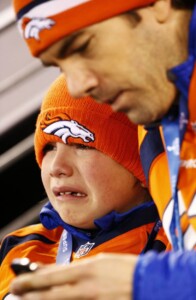 , they drop to their knees and weep, and when the host country of a World Cup tournament loses 7-1 the entire nation is not only upset but humiliated. And when their teams win it all, they celebrate in a bigger, more exultant way than when they marry, or win an election, or give birth, or are promoted. They celebrate as if their very lives have been saved, as if their existence on this planet has been granted meaning. It means that they have, for once, fastened their heart to something that turned out to be triumphant, that by living in this place and by suffering through all those losses they have earned this victory, they deserve it, and it’s all been worth it, and they can die in peace.
, they drop to their knees and weep, and when the host country of a World Cup tournament loses 7-1 the entire nation is not only upset but humiliated. And when their teams win it all, they celebrate in a bigger, more exultant way than when they marry, or win an election, or give birth, or are promoted. They celebrate as if their very lives have been saved, as if their existence on this planet has been granted meaning. It means that they have, for once, fastened their heart to something that turned out to be triumphant, that by living in this place and by suffering through all those losses they have earned this victory, they deserve it, and it’s all been worth it, and they can die in peace.
And if they don’t experience such triumph (again, I’m talking to you, Cubs fans), they brag about how much they have suffered, how loyal they are. Oh sure, they say, it’s easy to be a Yankees fan. To be a Cubs fan? That takes integrity. True loyalty. What has not killed us has made us stronger. (And more obnoxious, apparently, judging by the Cubs fans’ behavior at visiting ballparks.)
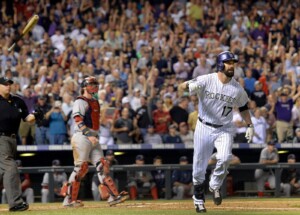 At bottom, it’s all just a diversion—sports, that is—just as, perhaps, watching the strongest fighter battling a mastodon thousands of years ago was. But such battles, such sports, were more meaningful back then: if the human won, that meant everyone got to eat; when warriors kicked a severed head of the enemy around the battlefield in celebration of the kill (the origin of soccer, by the way), it meant breaking the opponents’ spirit and bringing about victory in war, not being enslaved by the winner, having plenty of food and money, and so on. So maybe we’re carrying around that ancestral meaning now, in our genes, even though this form of diversion–sports–has become meaningless in the grand scheme of things. Or let’s say relative harmless instead, except, unfortunately, to the athletes.
At bottom, it’s all just a diversion—sports, that is—just as, perhaps, watching the strongest fighter battling a mastodon thousands of years ago was. But such battles, such sports, were more meaningful back then: if the human won, that meant everyone got to eat; when warriors kicked a severed head of the enemy around the battlefield in celebration of the kill (the origin of soccer, by the way), it meant breaking the opponents’ spirit and bringing about victory in war, not being enslaved by the winner, having plenty of food and money, and so on. So maybe we’re carrying around that ancestral meaning now, in our genes, even though this form of diversion–sports–has become meaningless in the grand scheme of things. Or let’s say relative harmless instead, except, unfortunately, to the athletes.
Sports, like religion, is the opiate of the masses, a raison d’etre for the poor and disenfranchised (except for the fact that the poor and disenfranchised can no longer afford tickets), just as a rock band or hip-hop artist could be to a sad and lonely teenager. One’s devotion to it may provide a modicum of meaning to a life that has little meaning. Or for me, and for millions of other adults who love sports, it could be a way of remembering the beautiful connectivity we felt when we played, the “team-ness” (which I wrote about here) we still crave. We remember, in the cells of our body, what it felt to be outdoors, or in a gym, working in unison with our peers to achieve a goal—an enterprise in which (as Philip Larkin said of unused churches) ordinary events are “robed as destinies.” We know they are meaningless, and yet at the same time we assign great meaning to them, for we crave, enjoy, and need this connectivity and purpose, especially when our devotion also links us with a community of likeminded worshippers–which is, beneath it all, something wonderfully tribal that religion provides as well.
Forgive me, then, as I predict great success for the Rockies this year, in spite of their slow start, for I am doing so with the full comprehension of its silliness and delusion even while I earnestly assign great importance to it. (As F. Scott Fitzgerald said, “the test of a first rate intelligence is the ability to hold opposed ideas in the mind at the same time, and still retain the ability to function.”) You should look kindly upon me, pathetic as I am, for it means that I retain and am expressing hope and faith in what is fast becoming an utterly hopeless and faithless world.
![]()


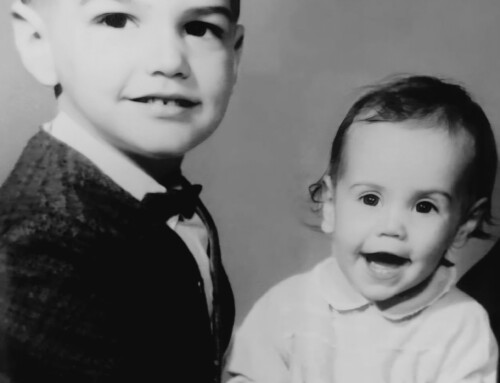

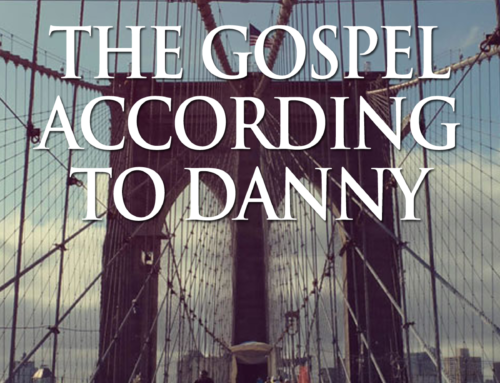

Jim was always sure this was the year the Phillies took it all!!! Eternal optimists both of you.lol
:-)
Actually, I HATE losing teams. It’s so difficult finding them again.
This post, David, is terrific. So honest. I don’t know whether we do these [sports] things from the spirit or from the intellect. I recall my interest in pro football at one time; that began as a mnemonic sort of pursuit [who was George Blanda’s college football coach? Paul “Bear” Bryant, Univ. of Kentucky!]. I’ve heard it said that baseball is what America was, and the NFL is what we are today. Nowadays I attach myself mostly to thoroughbred racing. That’s not exclusively reliant upon human judgment, skill or foibles. And one can bet on it legally! Otherwise, we can simply appreciate from a distance the artistry of a Pele or a Gretzky, between the commercials. $7 hot dog, anyone?
Thanks, Greg!
Let me give you a helpful hint.
For decades I have heard cub fans say the cubs have enough offense. I point out that their offensive numbers are significantly affected by the fact they play half their games in an extreme hitters park.
But, no, keith moreland really is a good hitter. Leon durham, too. Etc.